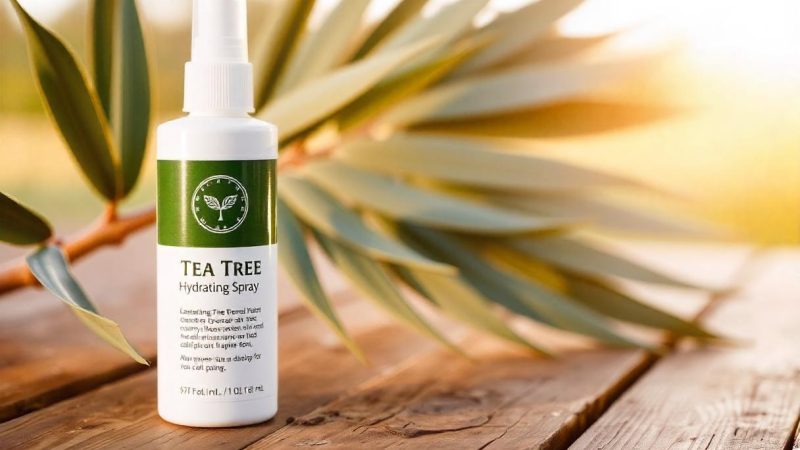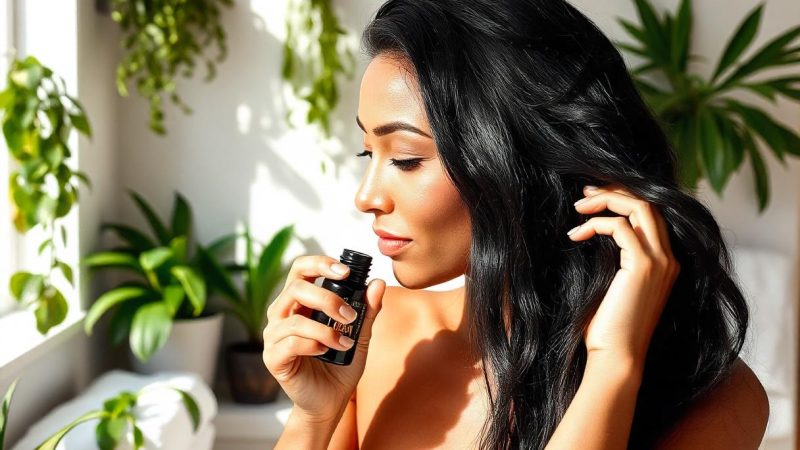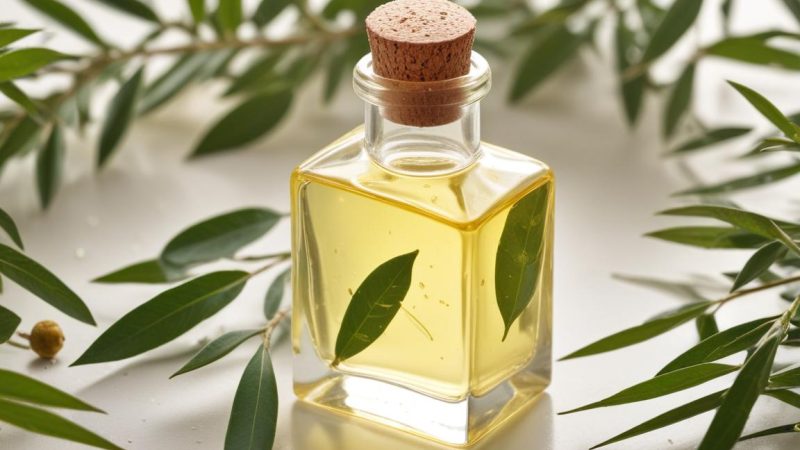Tea Tree Oil for Scalp Care: Benefits and Best Ways to Use It

Tea tree oil, derived from the leaves of the Melaleuca alternifolia tree native to Australia, has gained popularity in the world of hair care for its numerous benefits, particularly for scalp health. This essential oil is well-known for its antiseptic, antifungal, and anti-inflammatory properties, making it a powerful natural solution to various scalp issues. Whether you’re dealing with dandruff, a dry scalp, or even hair loss, tea tree oil offers a natural way to nourish your scalp and improve overall hair health. Here’s a deep dive into the benefits of tea tree oil for your scalp and how to use it effectively.
1. Fights Dandruff
Dandruff is one of the most common scalp problems, caused by a variety of factors including dryness, fungal infections, or an overproduction of sebum. Tea tree oil is known for its ability to fight Malassezia, the fungus often responsible for dandruff. Its antifungal properties help eliminate dandruff-causing microbes, while its anti-inflammatory nature soothes an irritated scalp.
A study published in the Journal of the American Academy of Dermatology showed that a 5% tea tree oil shampoo reduced dandruff in participants by 41% after a month of use. Not only does tea tree oil address the underlying causes of dandruff, but it also helps reduce itchiness and flakiness.
How to Use:
- Add 5-10 drops of tea tree oil to your regular shampoo.
- Massage it into your scalp for 3-5 minutes before rinsing thoroughly.
- For severe dandruff, consider using a tea tree oil-based shampoo daily for the best results.
2. Soothes a Dry and Itchy Scalp
Tea tree oil’s moisturizing and soothing properties can significantly improve a dry and itchy scalp. Dry scalp can result from overuse of styling products, harsh shampoos, or even environmental conditions. Tea tree oil works by hydrating the scalp and alleviating itchiness, all while ensuring that the natural oil balance is maintained.
According to research published in the Journal of Dermatology, tea tree oil was found to relieve symptoms of dry scalp and reduce scalp irritation when used regularly. The oil’s anti-inflammatory effects make it an excellent remedy for scalp conditions like seborrheic dermatitis and eczema.
How to Use:
- Mix 5-8 drops of tea tree oil with a carrier oil, such as coconut or olive oil.
- Massage it into your scalp, paying special attention to dry areas.
- Let it sit for 20-30 minutes before washing your hair with a mild shampoo.
- Repeat 1-2 times per week to keep your scalp hydrated and itch-free.
3. Promotes Hair Growth and Reduces Hair Loss
Tea tree oil can improve hair growth by unclogging hair follicles and improving blood circulation to the scalp. Hair loss often results from blocked hair follicles, excess oil, or inflammation. Tea tree oil helps clean the scalp of impurities that may hinder hair growth, thus creating a healthy environment for new hair to grow. It also strengthens the roots and can reduce hair thinning caused by scalp conditions.
A study published in the Journal of Cosmetic Science highlighted that tea tree oil’s antimicrobial and antioxidant properties can help maintain a clean, healthy scalp, which is essential for encouraging new hair growth.
How to Use:
- Add 3-5 drops of tea tree oil to your favorite carrier oil (such as jojoba or almond oil).
- Massage the mixture into your scalp, ensuring even coverage across the scalp.
- Leave the oil on for 30 minutes, or for best results, leave it overnight.
- Wash your hair thoroughly the next morning. Repeat 2-3 times a week.
4. Kills Head Lice
Head lice are a common and frustrating scalp issue, particularly for children. Tea tree oil has natural insecticidal properties that make it effective in killing lice and their eggs. The terpinen-4-ol compound found in tea tree oil can dissolve the outer shell of lice and reduce their ability to survive. Its antiseptic properties also prevent scalp irritation caused by lice infestations.
A study published in Parasitology Research confirmed that tea tree oil effectively eradicated head lice in 100% of cases when applied correctly, making it a reliable natural remedy for this condition.
How to Use:
- Mix 5-10 drops of tea tree oil with a carrier oil (like coconut oil) or add to your shampoo.
- Apply the mixture to the scalp and hair, focusing on the roots and the nape of the neck where lice tend to congregate.
- Leave it on for 30-40 minutes before washing your hair thoroughly.
- Use a lice comb to remove any dead lice and nits.
- Repeat every few days until the infestation is completely gone.
5. Prevents Scalp Infections
Tea tree oil is a powerful antimicrobial agent, capable of preventing bacterial and fungal infections of the scalp. Scalp infections can cause a variety of issues, including redness, irritation, and in some cases, hair loss. By keeping your scalp clean and free from bacteria and fungi, tea tree oil ensures a healthy environment for hair to thrive.
In addition, its antibacterial properties make it ideal for preventing folliculitis (inflammation of the hair follicles), ringworm, and other scalp infections.
How to Use:
- Add 4-5 drops of tea tree oil to a mild shampoo or conditioner.
- Massage the product into your scalp and leave it on for a few minutes before rinsing.
- Use regularly to prevent infections and maintain a healthy scalp.
6. Controls Excess Sebum Production
An oily scalp can lead to clogged pores, dandruff, and other scalp issues. Tea tree oil works by balancing the scalp’s natural oil production, preventing the scalp from becoming too oily or too dry. Its deep cleansing properties remove excess sebum, allowing hair follicles to remain open and healthy.
Research published in Phytotherapy Research found that tea tree oil helps balance the production of sebum, making it particularly useful for those with an oily scalp or conditions like seborrheic dermatitis.
How to Use:
- Add a few drops of tea tree oil to your shampoo and massage it into your scalp.
- Alternatively, mix 3-5 drops of tea tree oil with a carrier oil and apply it to your scalp.
- Let it sit for 20 minutes before washing it out with a mild shampoo.
- Regular use will help reduce oiliness and keep your scalp balanced.
Final Thoughts
Tea tree oil is a versatile and effective remedy for numerous scalp issues, ranging from dandruff and dry scalp to infections and hair loss. Its antimicrobial, antifungal, and anti-inflammatory properties make it an essential addition to any scalp care routine. However, tea tree oil is highly concentrated and should always be diluted with a carrier oil or added to shampoo to avoid irritation, especially for those with sensitive skin.
Consistency is key when using tea tree oil to address scalp concerns, so ensure regular use for best results. If irritation occurs, discontinue use and consult a dermatologist.
Sources:
- Satchell, A. C., Saurajen, A., Bell, C., & Barnetson, R. S. C. (2002). Treatment of dandruff with 5% tea tree oil shampoo. Journal of the American Academy of Dermatology.
- Hammer, K. A., Carson, C. F., & Riley, T. V. (2006). Antimicrobial Activity of Tea Tree Oil. Clinical Microbiology Reviews.
- Mayo Clinic. (2022). Tea Tree Oil: Overview and Benefits.
- Lee, M. R. (2019). The Treatment of Seborrheic Dermatitis and Scalp Issues with Essential Oils. Phytotherapy Research.
- Messager, S., Goddard, P. A., & Dettmar, P. W. (2005). The Antifungal Activity of Tea Tree Oil against Malassezia Yeast. Journal of Cosmetic Science.





